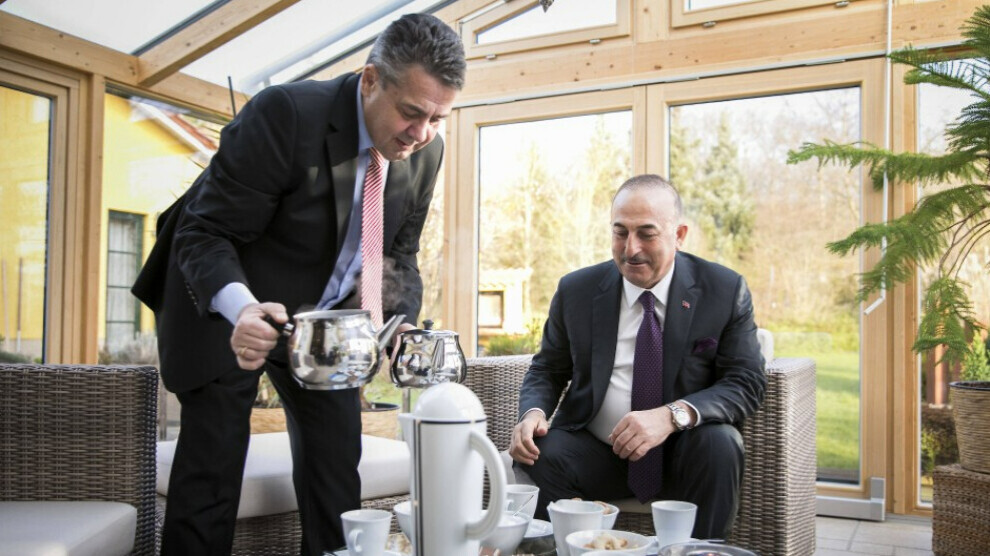German Interior Minister visits Ankara amid new Turkish attacks on Rojava and Bashur
German Interior Minister Nancy Faeser is visiting Ankara as the Turkish state has recently launched attacks on Rojava and South Kurdistan.
German Interior Minister Nancy Faeser is visiting Ankara as the Turkish state has recently launched attacks on Rojava and South Kurdistan.

As in recent years, German state officials have once again come into contact with the AKP-MHP regime shortly after a new wave of attacks against the Kurds and other parts of Kurdistan. German Interior Minister Nancy Faeser paid a visit to Ankara on Monday, right after the Turkish state launched a new invasion attack on Rojava and Bashur (South) Kurdistan on November 19.
Faeser’s two-day official visit to Turkey was announced on November 18, the day before the invasion attacks began. Faeser addressed the cooperation between the two countries, the "fight against terrorism", "security" and the illegal refugee influx in a meeting with Turkish Minister of Interior Süleyman Soylu.
NEW BARGAINS FOR TURKISH ELECTIONS?
It is reported that Faeser, who spoke to Turkish Minister of Interior Süleyman Soylu on the phone last January, might talk about the voting process in Germany for the upcoming Turkish elections and the election campaign of the ruling AKP. It is further reported that the AKP may conduct negotiations with the Berlin administration in order to run its election campaigns in Germany, an election stronghold of Erdoğan, before the general elections in Turkey next year.
Recently it was revealed that the AKP-MHP government had started the election campaign in the mosques run by Turkey-affiliated DITIB in Germany. Moreover, letters signed by Turkish President Recep Tayyip Erdoğan were sent to Turkish citizens living in Germany. Prior to the 2017 referendum, the German government banned the AKP and other Turkish political parties from running election campaigns inside Germany, which caused a crisis between the two countries.
'SOFT' WARNING FROM BERLIN
Meanwhile, as Interior Minister Nancy Faeser was on her way to Ankara, a "soft" warning came from the Berlin administration concerning the invasion attacks by the Turkish state. “We call on Turkey to act proportionately and respect international laws. We call on Turkey, along with all other actors, not to further escalate the current tensions in northern Syria and Iraq,” German Foreign Ministry spokesman Christopher Burger said.
German spokesperson Burger also endorsed Turkey which used the Taksim attack as a pretext for the invasion attacks: “The German government takes the suspicion that the PKK or groups close to the PKK are responsible for the Taksim attack very seriously. But Article 51 of the UN Charter does not stipulate that the right of self-defence also includes the right to retaliate.”
Contrary to the spokesperson of the Ministry of Foreign Affairs, prominent members of the Green Party, one of the partners of the German government of Prime Minister, Olaf Scholz, called for putting an end to the Turkish attacks, which they said were at odds with international laws. The opposition Left Party has also put forward a similar call.
GERMANY COMES TO THE FORE BEFORE TURKISH ATTACKS
Previously, Germany came to the fore with its frequent diplomatic contacts with the Turkish state during the critical stages of the annihilation concept that targeted the Kurdish people. In the autumn of 2015, when the Turkish state waged war against cities and districts in North Kurdistan, German Chancellor Angela Merkel seemed to be on familiar terms with Erdoğan during an official visit. Merkel's visit, which arrived before the November 1 elections, was considered as open support for the AKP-MHP coalition.
In the first days of 2018, when the Turkish state was preparing for an invasion attack against Afrin together with its mercenaries, then Foreign Minister Sigmar Gabriel invited Turkish Foreign Minister Mevlüt Çavuşoğlu to his hometown and held a long meeting with him. In a warm atmosphere, Gabriel personally served tea during the meeting with Çavuşoğlu.
In mid-October 2019, when the Turkish state escalated its attacks on Girê Spî and Serêkaniyê, German Foreign Minister Heiko Maas went to Ankara and shared intimate moments with the ministers of the AKP-MHP regime. Maas, who also went to Erdoğan's palace, made statements that justified the invasion attack.
On February 2, 2021, Turkish Defence Minister Hulusi Akar came to Berlin and had a long meeting with his German counterpart, Annegret Kramp-Karrenbauer. It was noteworthy that Akar preferred Berlin after his visits to Hewler and Baghdad. About 10 days after Akar’s visit to Berlin, on February 13, 2021, the Turkish army launched a large-scale attack on Garê, a stronghold of the Kurdistan Freedom Guerrillas. The German Government did not unveil the details of the meeting with Akar and rejected to reply to the parliamentary questions of the Left Party, saying that it was a "state secret".